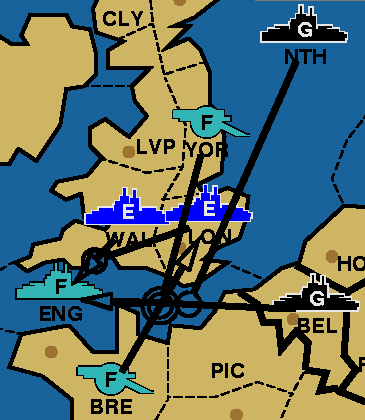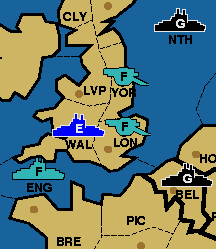


F Lon S F Wal - ENG
A Bre - ENG - Lon
F ENG C A Bre - Lon
A Yor S A Bre - Lon
F Bel - ENG
F NTH S F Bel - ENG


Paradox-eliminating Rule Number 1: "If a convoyed army attacks a fleet that is supporting an action in or into a body of water that contains a convoying fleet, that support is not cut by the convoyed army under any circumstance (but a convoying army does cut all other supports normally)."Paradox-eliminating Rule Number 2: "If a situation arises in which an army's convoy order results in a paradoxical adjudication, the turn is adjudicated as if the convoying army had been ordered to hold."
In case you want to see the setup again, here is the initial setup and the two outcomes:
| Original Situation | Resolution Using Rule 1 | Resolution Using Rule 2 |
|---|---|---|

| 
| 
|
|
F Wal - ENG F Lon S F Wal - ENG A Bre - ENG - Lon F Bel - ENG | ||
Before moving on to the discussions, a couple of general points.
So by way of a disclaimer, it should be noted that Simon and Manus do not claim that their proposed solutions are consistent with the current rulebook. Their claim is that the rulebook is already flawed by inconsistencies that causes paradoxes, and that those paradoxes can be eliminated by adding one of these proposed rules. With or without the paradox-eliminating rules, the rulebook includes consistencies. So they advocate an inconsistent set of rules where paradoxes have been eliminated over an inconsistent set of rules that allows paradoxical situations. And these rules will only affect these rare situations where paradoxes arise... they will not affect regular gameplay.
And with that, you can read the two discussions, one making a case for rule 1 over rule 2, and the other making a case for rule 2 over rule 1.

|
Manus Hand (manus@diplom.org) |

|
Simon Szykman (simon@diplom.org) |
If you wish to e-mail feedback on this article to the author, and clicking on the envelope above does not work for you, feel free to use the "Dear DP..." mail interface.

